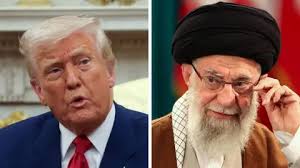
Breaking News
 Standing at the Edge of the Iran War Cliff
Standing at the Edge of the Iran War Cliff
 Bond Market's Steepener Bet Gets Turbocharged Amid Tariff Mayhem
Bond Market's Steepener Bet Gets Turbocharged Amid Tariff Mayhem
 Arizona to Remove Up to 50,000 Noncitizens From Voter Rolls After Successful Conservative Lawsuit
Arizona to Remove Up to 50,000 Noncitizens From Voter Rolls After Successful Conservative Lawsuit
Top Tech News
 Kawasaki CORLEO Walks Like a Robot, Rides Like a Bike!
Kawasaki CORLEO Walks Like a Robot, Rides Like a Bike!
 World's Smallest Pacemaker is Made for Newborns, Activated by Light, and Requires No Surgery
World's Smallest Pacemaker is Made for Newborns, Activated by Light, and Requires No Surgery
 Barrel-rotor flying car prototype begins flight testing
Barrel-rotor flying car prototype begins flight testing
 Coin-sized nuclear 3V battery with 50-year lifespan enters mass production
Coin-sized nuclear 3V battery with 50-year lifespan enters mass production
 BREAKTHROUGH Testing Soon for Starship's Point-to-Point Flights: The Future of Transportation
BREAKTHROUGH Testing Soon for Starship's Point-to-Point Flights: The Future of Transportation
 Molten salt test loop to advance next-gen nuclear reactors
Molten salt test loop to advance next-gen nuclear reactors
 Quantum Teleportation Achieved Over Internet For The First Time
Quantum Teleportation Achieved Over Internet For The First Time
 Watch the Jetson Personal Air Vehicle take flight, then order your own
Watch the Jetson Personal Air Vehicle take flight, then order your own
 Microneedles extract harmful cells, deliver drugs into chronic wounds
Microneedles extract harmful cells, deliver drugs into chronic wounds
 SpaceX Gigabay Will Help Increase Starship Production to Goal of 365 Ships Per Year
SpaceX Gigabay Will Help Increase Starship Production to Goal of 365 Ships Per Year
Trump Envoy In First 'Direct, Constructive' Contact With Iran After Laying Down Red Line

While Tehran has been emphasizing the indirect nature of the dialogue, President Trump and his top officials have been calling these 'direct' talks.
The main 'positive' is that the two sides didn't yell each other out the room, or make new accusations - instead they agreed to keep the diplomatic engagement going.
"Iran and the United States will hold more negotiations next week over Tehran's rapidly advancing nuclear program, Iranian state television reported Saturday at the end of the first round of talks between the two countries since President Donald Trump returned to the White House," The Associated Press reports as the meeting wrapped up.
As for whether they were 'direct' or not, Iranian state did say that Trump regional onvoy Steve Witkoff and Iranian Foreign Minister Abbas Araghchi "briefly spoke in the presence of the Omani foreign minister" at the end of the talks.
This does indeed mark the first direct interaction between the Islamic Republic and the Trump administration. It is Trump during his first term who pulled the US out of the 2015 JCPOA nuclear deal (in April 2018).
The Iranian side has announced that the next round of talks will take place April 19, in a clear sing that both sides could be ready to do a new deal. This is precisely what Trump has demanded - the inking of a new nuclear deal - while threatening military action against Tehran. Trump has also warned that Israel might 'lead' such strikes on nuclear facilities.
According to more details from Muscat, Oman on Saturday:
American officials did not immediately acknowledge the Iranian reports, which Tehran likely speeded out to its public ahead of a possible Trump post on a social media. But declaring that the two sides spoke face-to-face — even if briefly — suggests the negotiations went well.
The talks began at around 3:30 p.m. local. The two sides spoke for over two hours at a location in the outskirts of Oman, ending the talks around 5:50 p.m. local time. The convoy believed to be carrying Witkoff returned to Muscat, the capital of Oman, before disappearing into traffic around a neighborhood that is home to the U.S. Embassy.

 The deep state is ISRAEL
The deep state is ISRAEL

